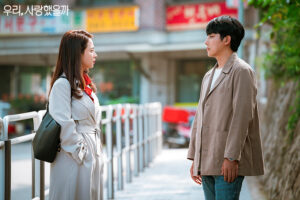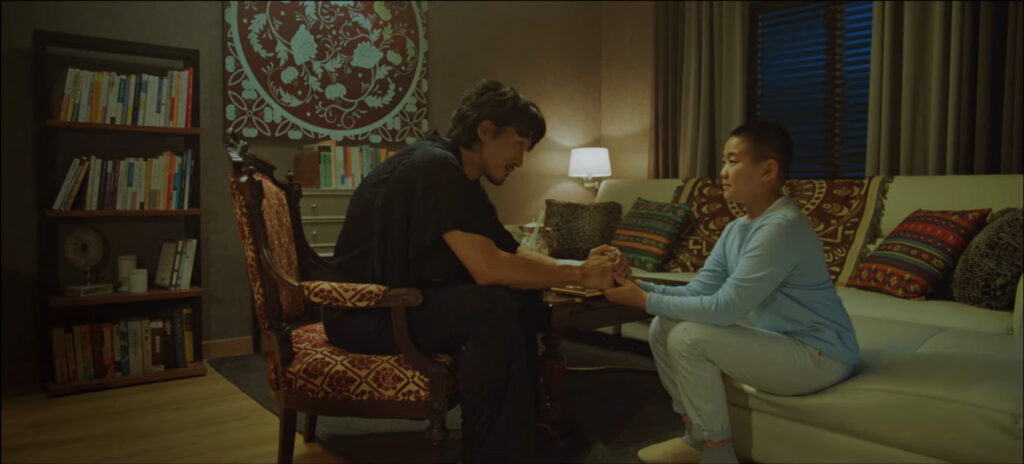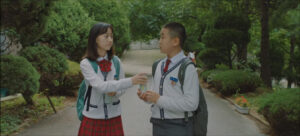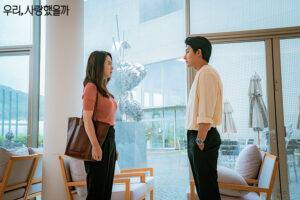
JTBC‘s Was It Love? has been a mixed bag, but it benefited from a host of unusual characters, and some belated but much-needed character moments for its lead character, single mother and budding film producer Noh Ae-jeong (Song Ji-hyo). The last quarter, however, tips the scales once again with questionable writing decisions.
Karen and Qing return for the final review, discussing Ae-jeong’s overall development as a character, some of the show’s saving graces in other characters, and the self-sabotage of the final episode’s last half-hour.
Qing: We were first drawn to Was It Love? by the second teaser’s use of Ha-nee’s (Um Chae-young) voice, which sets it apart from previous dramas focusing on single mothers welcoming changes in their lives, or setting out for another chance at things they missed while working hard to raise their children alone.
The show seemed to promise two narrative strands: Ha-nee’s search for her birth father, and Ae-jeong finding love again, while also getting an opportunity to fulfil her dream of becoming a film producer. Now that we have the full picture of the plot, what did you think of the show’s execution of this premise?
Karen: In our first review of the drama, we recognised the unique situation of Ae-jeong as a single mother, but were unsure about her being a character to root for. The series had put her in the path of numerous coincidences, leaving her little room to make active decisions and steer her own path. It seems that even as the drama comes to an end, it is hard to say Ae-jeong has grown much despite the series of unfortunate events she is made to conquer.
Her relationship with Oh Dae-oh (Son Ho-jun) comes to a happy conclusion with the dramatic kidnapping of Ha-nee, Dong-chan (Yoon Sung-woo), and herself. Dae-oh sweeps in like a hero to save Ha-nee from an explosion, and hence, all past grudges or misunderstandings are resolved. The audience is deprived of a genuine rebuilding of their romance, even after the rare moment of growth we see from Ae-jeong in her serious chat with Dae-oh at the playground.
Her sassiness and often obstinate independence becomes a character flaw when she persists in shielding Ha-nee from the truth behind Dae-oh’s “abandonment.” Yet another scandal blows up in the last episode, leaving Ha-nee at a loss with regards to explaining her own birth. Ae-jeong doesn’t seem to learn that Ha-nee is old enough to be given the right in making her own decisions about her birth father, making me question the approach of her motherly love. It is Dae-oh who interferes and clears up this misunderstanding with Ha-nee, right before he whisks himself away into who-knows-where.
As a whole, I’m not too impressed with Ae-jeong’s character trajectory, or lack thereof. She lets coincidences guide her path, and it is hard to provide solid evidence behind her skills as a producer or a character that has grown from her experiences. I am glad she has her happy ending, but probably also because I do want a character like Ha-nee to have a pleasant resolution. How did the last four episodes fare for you?
Qing: While I don’t mind the dramatic kidnapping incident as a way to show Dae-oh’s genuine concern, it was used too conveniently, as you noted. Ae-jeong was absolved of the responsibility to explain to Ha-nee the misunderstandings that transpired between her and Dae-oh. The incident should have been a jumping board for a long-overdue conversation between mother and daughter, not a replacement for the conversation itself.
This mishandled plot detail ties in with other missed opportunities. Despite its missteps, Was It Love? had the potential to shine, if it had developed two themes latent in the narrative. A thread that runs through the conflicts is the importance of open communication in maintaining any relationship. We saw how Dae-oh’s lack of communication about his family problems caused Ae-jeong to misunderstand that he was growing tired of her, and eventually led to their estrangement and Ae-jeong raising their child alone. We also saw how Dong-chan and Ha-nee’s friendship was affected when Dong-chan doesn’t open up about his concerns about his mother, and how Ha-nee suffered because Ae-jeong wouldn’t debunk the assumption that Dae-oh abandoned them both.

More broadly, there’s also the idea of found family: Ae-jeong’s unplanned pregnancy may have caused her hardships, but it also brought her joy to raise Ha-nee in an unconventional family unit of strong women, comprising her mother (Kim Mi-kyung) and best friend Sook-hee (Kim Young-ah). Yeon-woo (Koo Ja-sung) suffered under a controlling mother, but found support and solace with Ae-jeong’s family. Pa-do (Kim Min-jun) left behind life as a mafia member to adopt and raise a child of an unrequited love. Even Ryu Jin (Song Jong-ho) has his own form of family in his manager, Kwae-nam (Lee Hwa-ryong). Unfortunately, Was it Love? never focused on developing these themes.
Reflecting on these ideas, I realised that’s probably why I was most drawn to the narratives of Dong-chan and Ha-nee. They were the lodestones of the show, pushing for honest conversations that the adults failed miserably at. They prioritised understanding and connecting with those they loved over things like getting even, wish fulfillment, or pride and reputation.

Sadly, the adults’ narratives didn’t share these charming qualities. In fact, the writing even went so far as to force an abrupt “happy” ending on Dong-chan and Ha-nee that was incredibly premature and reductive. Between the last episode of Mystic Pop-up Bar and this, I’m beginning to think we’re jinxed by trainwreck finales.
Note: The rest of this review contains spoilers.
Karen: I am totally in agreement with you about the many missed opportunities for the drama to develop more meaningfully. But the wedding scene at the very end was truly the cherry on top for the rapid self-combustion that was the last episode.
At a certain point, I resigned myself to accepting Was It Love? as a light-hearted watch, and tried to forgive its slight mishandling of characters. However, I cannot bring myself to be lenient with regards to their sacrifice of Dae-oh’s character for the grand reunion at the drama’s end. It made sense to cancel the movie in light of the scandal about the truth behind Dae-oh’s novel, given his inability to continue as a writer whose work is now affected by his newfound knowledge of the past. What defied logic was Dae-oh vanishing, only to be revealed that he went as far as Europe to write a novel in another language and have it translated back into Korean, and then having this new novel be pitched to Ae-jeong a couple years later. If this isn’t being redundantly ostentatious, I don’t know what is. And such behaviour certainly doesn’t cohere with Dae-oh’s character.

What’s more, Dae-oh’s promise to start making up for lost time with Ae-jeong and Ha-nee goes poof into nothingness with such a move. And I find it hard to be convinced how the fondness between Ae-jeong and Dae-oh, as well as Ha-nee’s trust in Dae-oh does not falter, since we aren’t privy into whether they stayed in contact over the period of his disappearance (my guess is that they didn’t).
If the last few episodes had any redeeming factors, it’s probably just in seeing the loose ends of Ryu Jin’s story being tied up as he frees himself entirely from the clutches of his ex-boss and finding some joy in Joo A-rin’s (Kim Da-som) straightforwardness as usual.
I sigh as I recall the last 10 minutes of this show, and I think you can’t be more right in calling our predicament a terrible, terrible curse of badly executed endings. How do you feel about the conclusion to this drama and the journey it has pulled us along on in the past few weeks?
Qing: Like you, I didn’t have inflated expectations going into this drama; it was clear from the trailers that this was going to be a zany, lighthearted watch. The writer also shared that she intended the show to be a form of brief respite from the difficulties of modern life.
But fluff can be executed well—youth rom-coms like Weightlifting Fairy Kim Bok-joo and My ID is Gangnam Beauty come to mind. Here, it just wasn’t. The choice to create a grand reunion between the main couple after an unnecessary, extended period of separation felt contrived and illogical, and the choice to end with not Ae-jeong but Ha-nee’s wedding was confounding. The writing reverses any character growth we’ve seen in Ae-jeong and Dae-oh, and we can’t bring ourselves to support their romance, because it is a replay of their past mistakes.
I might have recommended Was It Love? as a comfortable watch that doesn’t require too much emotional investment, but with this final episode, I can’t do that in good conscience anymore. There are plenty more fantastical, uplifting K-dramas out there worth escaping into.
(YouTube. Images via JTBC.)


